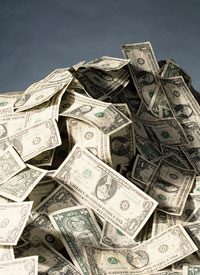
The law that approved the bailout gave Treasury Secretary Hank Paulson a great deal of discretion in terms of what to do with the money, and because of that, lobbyists and other special interest groups quickly mobilized to get in on the action. According to a New York Times article entitled "Insurers are getting in line for piece of Federal bailout," the Financial Services Roundtable has already jumped in. The lobbying group for financial institutions asked the Treasury on October 24 to open up the $700 billion trough to broker-dealers, insurance companies, car companies, and even foreign-owned financial institutions.
Analysts quoted in the Times article did not believe insurance companies needed bailout money. Yet the Treasury Department is considering it, and some insurance companies may in fact be eligible to participate because of their expansion into other areas of the financial industry.
A top economic adviser to Barack Obama has stated that the Democratic presidential candidate supports the auto industry’s requests, this despite the fact that Congress recently approved a $25 billion loan to that industry. With the economy continuing its downward trend and with so many companies asking for a bailout, many believe the $700 billion authorizied by the bailout bill will have to be increased. Gerald O’Driscoll, a senior fellow at the Cato Institute and the former vice president at the Federal Reserve Bank of Dallas, was quoted on the bailout in the Christian Science Monitor as saying, "I bet they double it before they’re through."
Even though the bailout plan was supposedly meant to inject capital into failing banks so they could resume lending and avoid default, bankers say the money is being used to re-shape the entire financial sector. The government is encouraging mergers, with banks like PNC Financial using most of its 7.7 billion taxpayer dollars to acquire National City. The move follows a similar deal with Wells Fargo’s takeover of Wachovia. National City agreed to the merger after discovering that it was not on the list of banks set to receive bailout money.
Critics of the plan say that the government is rewarding companies’ failures while indirectly punishing success, which runs directly contrary to free-market principles. Also, the federal bureaucracy certainly is not beyond using the bailout money to help companies it favors, as opposed to handing it out impartially. The bailout and its consequences signal yet another dangerous precedent as America moves further down the road toward socialism.



